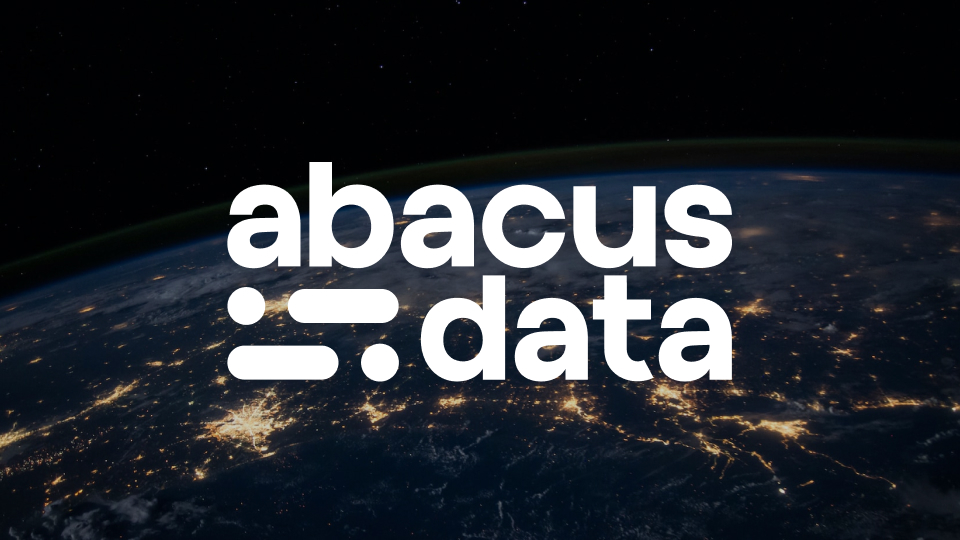Liberal Support Holds with Improving Economic Mood
July 20, 2017
Across the country, 43% say they would vote Liberal if a federal election were held today, 12 points ahead of the Conservatives (31%), and 27 points ahead of the NDP (16%).

In Ontario, the Liberals hold a 6-point advantage over the Conservatives, in BC, their lead is 13. The most interesting results in some respect are in Quebec, where the Liberals (at 53%) are almost 40 points ahead of the NDP, Conservatives, and BQ each of which is clustered around 14%.

A striking generational divide is evident in our latest numbers: the Liberals have a strong lead among Millenials and Gen X voters. The Conservatives are competitive with the Liberals among Baby Boomers and those in the Silent Generation.

Approval of the performance of the Trudeau government is at 48%, disapproval 34%. In every region except the Prairie provinces more people approve than disapprove of the federal government today. Among no age group do more people disapprove than approve of Ottawa’s performance.
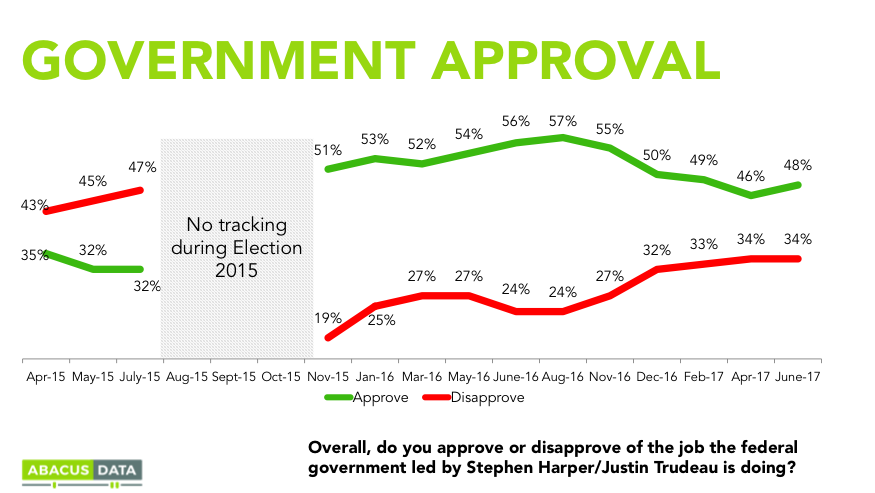
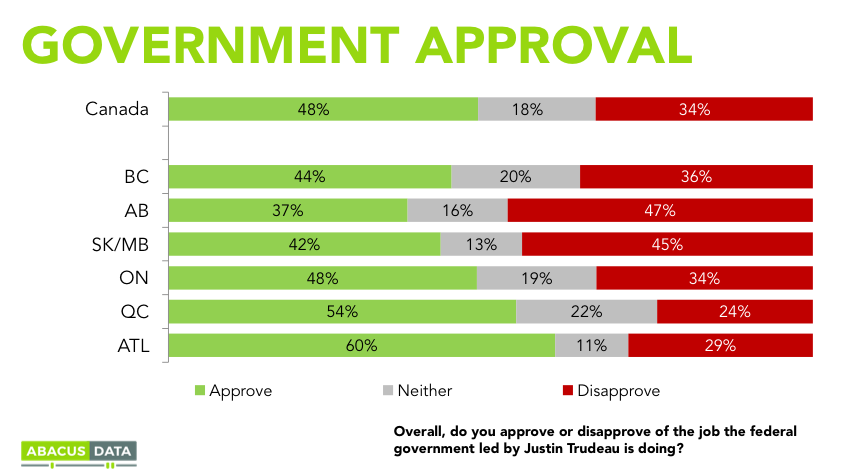
Feelings about Prime Minister Trudeau are up slightly from our reading in April, with 49% expressing a positive view and 30% negative. New Conservative leader Andrew Scheer is 20% positive, 22% negative.
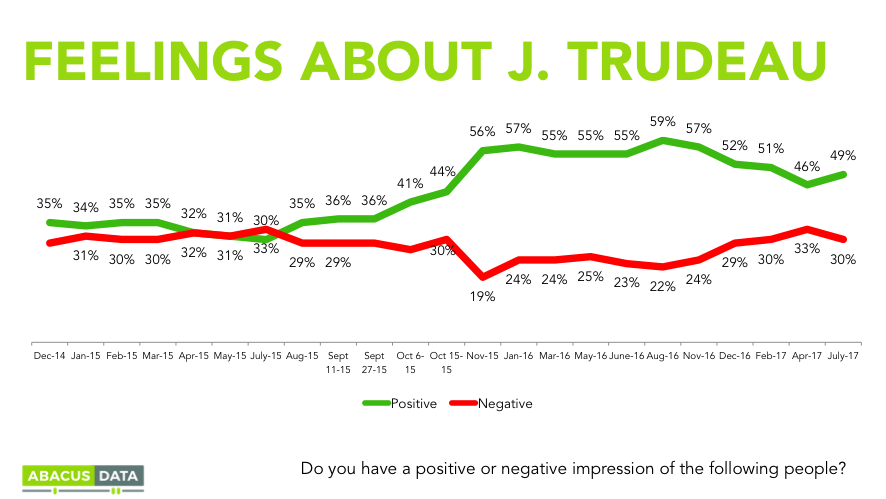
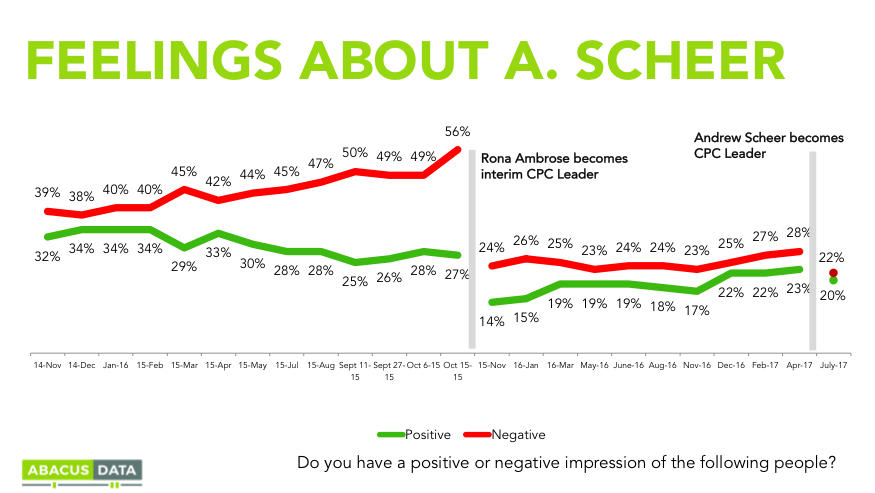
One of the reasons for the relatively strong standing of the government is that Canadians have sensed that the economy is picking up steam. Today, a substantial majority (68%) say the economy is growing, easily the strongest number we have seen since the last federal election.
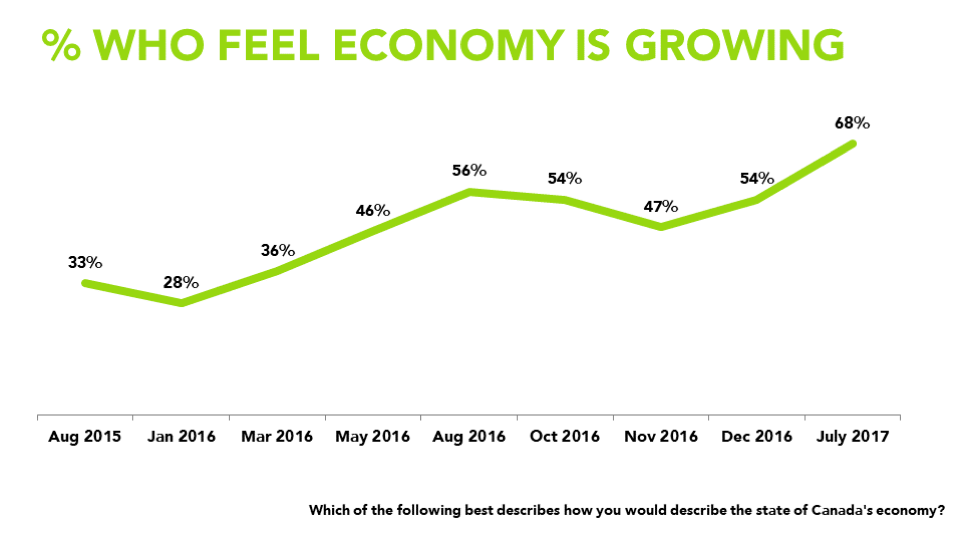
Majorities in every province including Alberta say the economy is growing. Positive evaluations about the economy are highest in Ontario and Quebec (72%) followed by BC (69%). Generationally, Boomers and those in the Silent generation are most positive, but a majority in every generation feels the Canadian economy is growing.
We also find broadly positive perceptions about the economy across income groups and among community types (urban, suburban, and rural). Most striking, however, is the strong sense of growth in Canada’s three largest urban centres.
It is also worth noting is that Conservative voters are not particularly unhappy with the economy right now, with 62% saying the economy is growing and 36% saying it is shrinking.
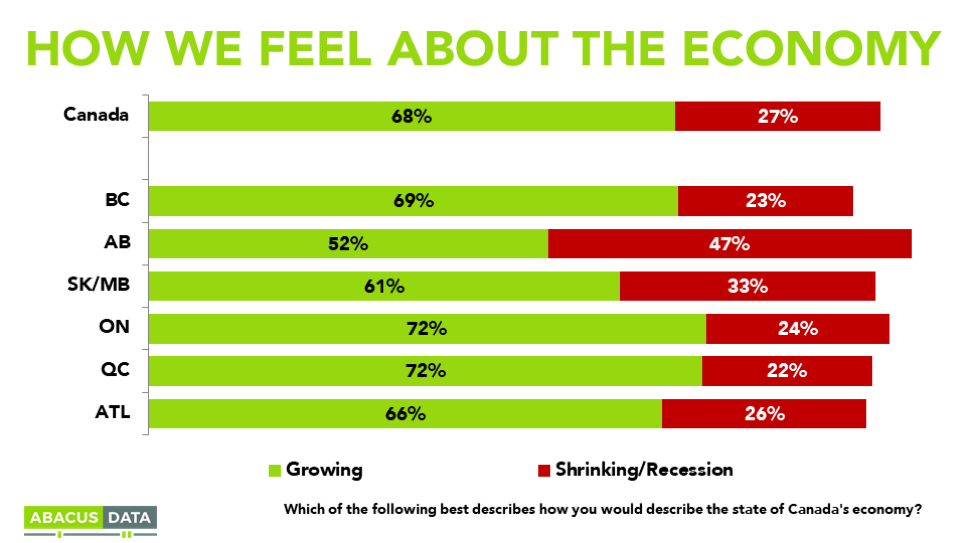
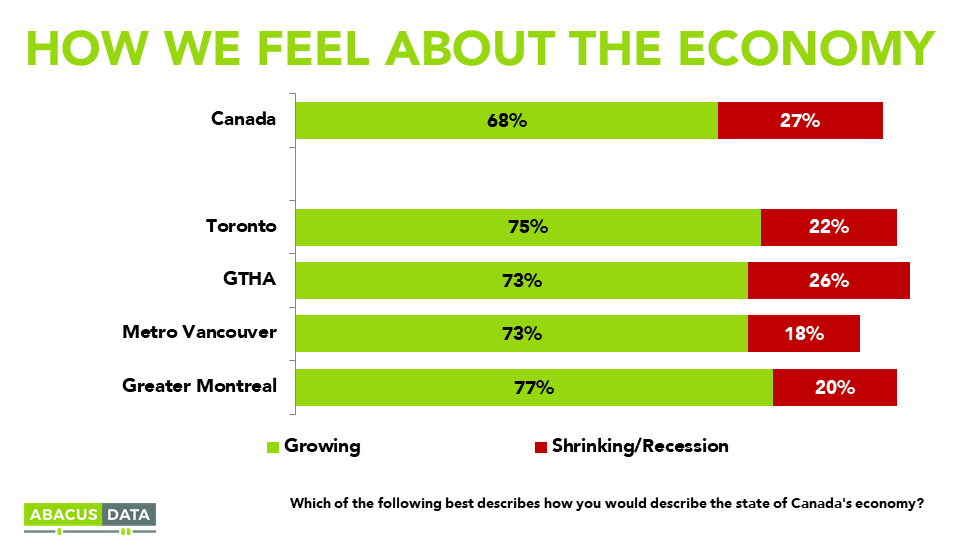

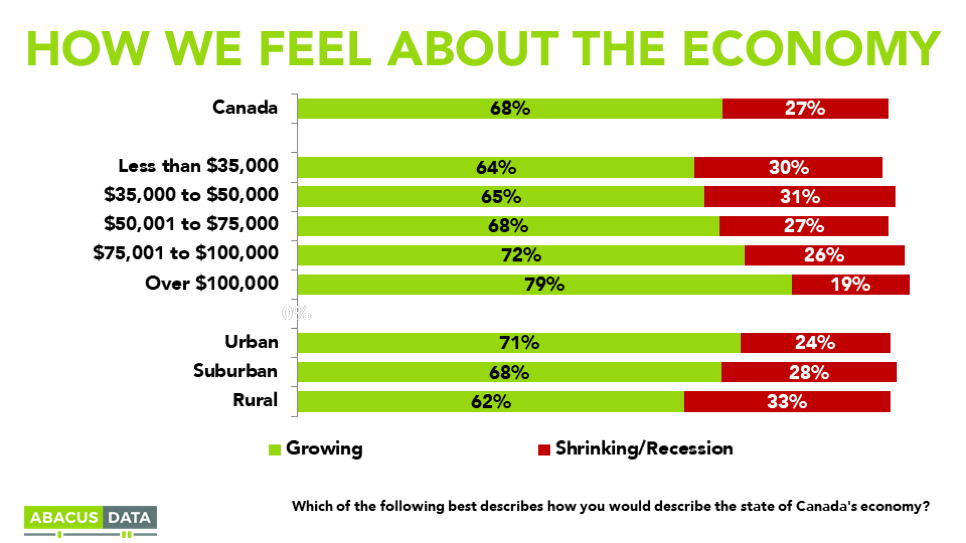
When we ask about the economic outlook six months from now we find that most of those who feel the economy is currently growing also feel that it will continue to grow or improve. Among those who think the economy is growing, almost no one expects it to begin shrinking in the next six months; among those who think the economy is in recession, just over a third expect conditions to worsen.
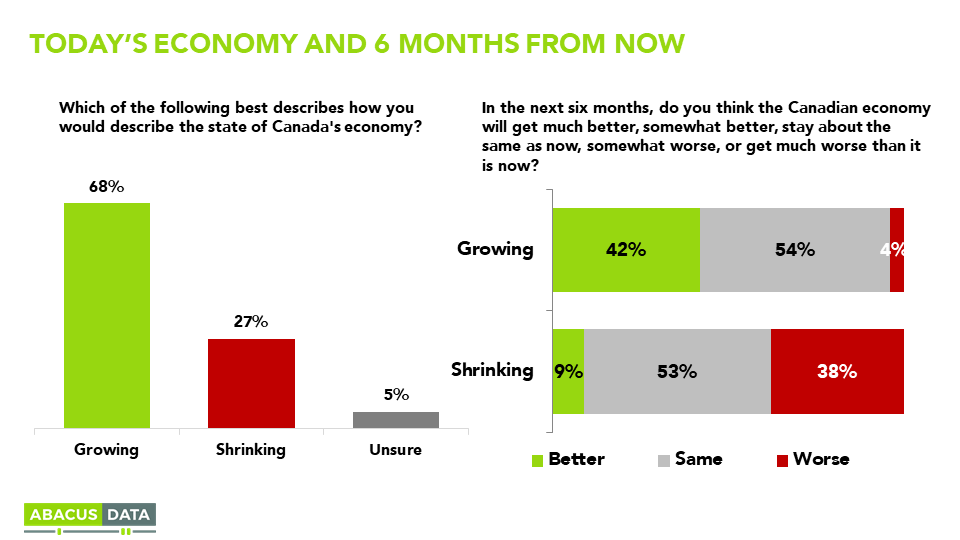
UPSHOT
According to Bruce Anderson:
“In our next release, we’ll examine reactions to a series of issues including NAFTA renegotiation, the Khadr settlement, and the government’s approach on climate change.
What these initial numbers show is that many people are feeling better about current economic conditions and are not showing any rise in fatigue with or frustration with the federal government. If anything, the government’s political prospects have strengthened a bit, as both the Conservatives and NDP seem to be struggling to connect with Quebec voters.
For the Conservatives, the generation gap remains a critical strategic dilemma: the policy mix that might animate older conservatives will disqualify the party from consideration among many younger Canadians.”
According to David Coletto:
“Despite a series of difficult decisions by the federal government, we find little evidence that Canadians feel any worse about the government today than they did in May. The government’s approval rating is up slightly, its share of the vote remains stronger than it received at the last election, and most Canadians are feeling good about their current and future economic prospects. The Liberal Party’s electoral coalition of young, urban and suburban middle-class voters, new Canadians plus well-educated Boomers remains intact.
These results remind us that we are in a new era of Canadian politics.
Not only do the distractions to the south attract an oversized share of Canadians’ attention but Prime Minister Trudeau’s approach and tone remain a sharp contrast to that of President Trump. In such an environment, the public assessments of the Prime Minister and his government are as much a function of their own performance than that of how it compares to Trump’s south of the border.
Very few Canadians are looking for a Canadian version of Trump or even Trump-lite. So, the choice for Conservative politicians is how to criticize this government’s fairly popular agenda, distance itself from the Trump administration, while at the same time offering a positive alternative to Trudeau and his team. So far, even in the direct “aftermath” of the decision to settle with Omar Khadr, we find little evidence of a shift in public affinity for the PM or the federal government.”
METHODOLOGY
Our survey was conducted online with 2,036 Canadians aged 18 and over from July 14 to 18, 2017 2017. A random sample of panelists was invited to complete the survey from a large representative panel of over 500,000 Canadians.
The Marketing Research and Intelligence Association policy limits statements about margins of sampling error for most online surveys. The margin of error for a comparable probability-based random sample of 2,036 is +/- 2.2%, 19 times out of 20.
The data were weighted according to census data to ensure that the sample matched Canada’s population according to age, gender, educational attainment, and region. Totals may not add up to 100 due to rounding.
ABACUS DATA INC.
We offer global research capacity with a strong focus on customer service, attention to detail and value-added insight. Our team combines the experience of our Chairman Bruce Anderson, one of Canada’s leading research executives for two decades, with the energy, creativity and research expertise of CEO David Coletto, Ph.D.
DETAILED TABLES
If a federal election were held tomorrow, which one of the following parties would you vote for in your constituency?
| Row % | LPC | CPC | NDP | GPC | BQ | Other | Undecided | Raw | Weighted | |
| Region | Canada | 34% | 25% | 13% | 4% | 3% | 1% | 21% | 2036 | 2036 |
| BC | 32% | 22% | 13% | 12% | 0% | 2% | 20% | 271 | 265 | |
| AB | 24% | 41% | 11% | 2% | 0% | 1% | 20% | 271 | 224 | |
| SK/MB | 26% | 31% | 16% | 5% | 0% | 0% | 20% | 373 | 143 | |
| ON | 33% | 28% | 13% | 3% | 0% | 1% | 22% | 370 | 794 | |
| QC | 42% | 11% | 12% | 4% | 11% | 0% | 20% | 320 | 468 | |
| ATL | 40% | 19% | 14% | 2% | 0% | 1% | 24% | 431 | 143 | |
| Gender | Male | 36% | 26% | 11% | 3% | 3% | 1% | 19% | 986 | 998 |
| Female | 32% | 23% | 14% | 5% | 2% | 1% | 23% | 1050 | 1038 | |
| Generation | Silent | 34% | 45% | 9% | 3% | 0% | 0% | 10% | 90 | 91 |
| Baby Boomers | 32% | 30% | 12% | 3% | 3% | 1% | 18% | 716 | 736 | |
| Gen X | 36% | 24% | 12% | 5% | 3% | 0% | 20% | 599 | 551 | |
| Millennials | 35% | 15% | 14% | 6% | 2% | 1% | 27% | 631 | 658 | |
| 2015 Vote | Conservative Party | 6% | 84% | 0% | 0% | 0% | 0% | 9% | 430 | 419 |
| Liberal Party | 68% | 8% | 8% | 2% | 0% | 0% | 13% | 699 | 660 | |
| NDP | 14% | 4% | 56% | 2% | 3% | 0% | 21% | 239 | 239 | |
Committed Voters Only
| Row % | LPC | CPC | NDP | GPC | BQ | Other | Raw | Weighted | |
| Region | Canada | 43% | 31% | 16% | 5% | 3% | 1% | 1608 | 1607 |
| BC | 40% | 27% | 16% | 15% | 0% | 2% | 222 | 212 | |
| AB | 31% | 52% | 14% | 3% | 0% | 1% | 217 | 178 | |
| SK/MB | 33% | 39% | 20% | 7% | 0% | 0% | 294 | 114 | |
| ON | 43% | 36% | 16% | 4% | 0% | 1% | 294 | 618 | |
| QC | 53% | 14% | 14% | 5% | 14% | 0% | 262 | 377 | |
| ATL | 53% | 25% | 18% | 3% | 0% | 1% | 319 | 108 | |
| Gender | Male | 45% | 33% | 13% | 4% | 4% | 1% | 800 | 808 |
| Female | 42% | 30% | 19% | 7% | 3% | 1% | 808 | 799 | |
| Generation | Silent | 37% | 49% | 10% | 3% | 0% | 0% | 81 | 82 |
| Baby Boomers | 39% | 37% | 15% | 3% | 4% | 1% | 575 | 601 | |
| Gen X | 45% | 30% | 15% | 6% | 4% | 0% | 469 | 441 | |
| Millennials | 48% | 21% | 19% | 8% | 2% | 2% | 483 | 484 | |
| 2015 Vote | Conservative Party | 6% | 92% | 0% | 0% | 0% | 0% | 388 | 382 |
| Liberal Party | 79% | 9% | 9% | 3% | 0% | 0% | 598 | 572 | |
| NDP | 18% | 5% | 70% | 3% | 3% | 0% | 204 | 190 | |


